
Mental Health First Aid
Every year 1 in 5 Australians will experience a common mental illness.
Unlock the Power of Mental Health First Aid with Alicia
Mental health awareness and support are increasingly vital in today's fast-paced world. Alicia Gibbs is a qualified counsellor, lifeline crisis supporter, and certified mental health first aid instructor. She brings over 15 years of experience in supporting people in crisis as well as those currently experiencing or recovery from a mental health episode. She has trained individuals in mental health first aid within corporate financial services and in community not for profit based settings.
Why Choose Alicia Gibbs?
Alicia combines her deep empathy and extensive experience as a lifeline crisis supporter to effectively address a wide range of mental health challenges. Her compassionate approach not only fosters resilience among participants but also plays a crucial role in breaking the stigma surrounding mental health issues.
“Alicia was wonderful, made a safe space, was clearly very knowledgable and had a lot of experience that she was comfortable sharing to help further explain the content ”
“Explained everything very clearly had a very warm and welcoming and respectful manner”
As an accredited mental health first aider, you will:
Learn about the signs and symptoms of common mental health problems in adults, how to provide initial help, where and how to get professional help, what sort of help has been shown by research to be effective, and how to provide first aid in a crisis situation.
Common mental health problems covered:
Depression
Anxiety
Psychosis
Substance use problems
Crisis situations you will feel equipped to provide support:
Suicidal thoughts and behaviours
Panic attacks
Traumatic events
Psychotic episode
At the completion of the course, participants complete a short assessment and then will be accredited mental health first aiders, valid for 3 years.
Alicia also offers refresher training, for participants who are current mental health first aiders and are looking to maintain their accreditation.
“Alicia was great! I really appreciated her sharing her insight... her facilitation style made the two days of training really welcoming and enjoyable”
“Our instructor was amazing. She was engaging and made sure we all understood and could apply skills we were taught. ”
“Gave everyone the space to ask questions or share personal stories. Generally created a great atmosphere.”
FAQs
-
The 12-hour course can be delivered in 1 of 3 ways:
Face-to-face: 2 x 6-hour sessions over 2 days
Blended Face-to-Face: Self-paced eLearning (5-7 hours), followed by a 4-hour face-to-face session
Blended Online: Self-paced eLearning (5-7 hours), followed by 2 x 2.5-hour videoconferencing sessionsFor the formats with self-paced learning participants must have completed the eLearning prior to the face to face or online sessions.
For the Face to face only version, no previous training is required.
-
A minimum of 6 participants.
For face to face a maximum of 24 participants.
For online a maximum of 12 participants.
-
This will depend on the number of participants, location and what your organisation may be looking for. Cost is somewhere between $350-$450+gst per person. This cost includes a copy of a mental health first aid manual for each participant.
-
Free of charge, a 90 minute session can be run specifically targeted at leaders who want to understand course content and the return on investment for mental health first aid.
-
Yes. The Refresher training can be run online, or face to face over 1× 5 hour session or 2× 2.5 hour sessions.
-
https://mhfa.com.au/
National support numbers
Mental Health First Aid is not a mental health or referral service, but undertaking this training can help guide those you care about to crisis and support services. If you are providing mental health first aid support to someone you know, you can use this list to help connect them with professional help. If someone is in immediate crisis, always call 000.
Lifeline | 13 11 14
Crisis support and suicide prevention services available via phone, text message or online chat.Counselling and crisis support for Aboriginal and Torres Strait Islander peoples.
Kids Helpline | 1800 551 800
Counselling for kids, teens and young adults aged between 5 and 25 available via phone and online chat.Suicide Call Back Service | 1300 659 467
Phone and online counselling to support people affected by suicidal thoughts or suicide available via phone, online chat and video calls.MensLine Australia | 1300 789 978
Counselling service offering support to men available via phone, online chat and video calls.SANE Helpline | 1800 18 7263
Counselling, peer support, online groups and community forums for people aged 18+ with complex mental health needs and their family, friends and carers.Beyond Blue | 1300 22 4636
Brief, confidential counselling services available via phone or online chat.Qlife | 1800 184 527
Anonymous LGBTQI peer support and referral available via phone and online chat.Open Arms | 1800 011 046
Counselling for anyone who has served at least one day in the Australian Defence Force and their families.Butterfly |1800 33 4673 For support with eating disorders or body image concerns, call Butterfly National Helpline or visit www.butterfly.org.au to chat online or email, 7 days a week, 8am-midnight (AEST/AEDT).




